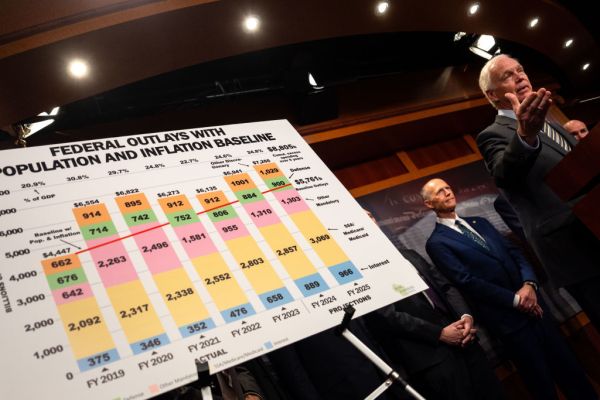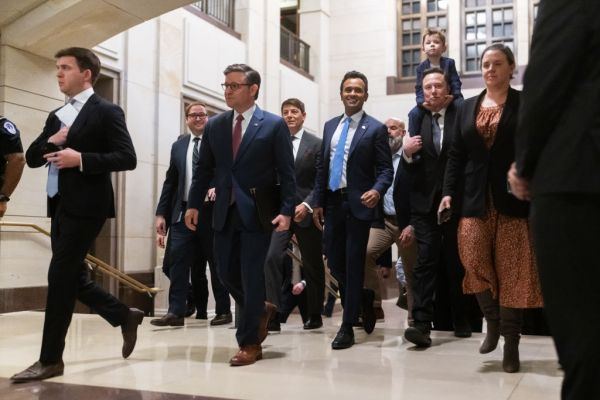Happy Monday! Just two days into 2025, the surgeon general issued an official advisory about the health hazards of alcohol consumption. We can’t imagine what Dr. Vivek Murthy got up to on New Year’s Eve to prompt such a report.
Quick Hits: Today’s Top Stories
- Lawmakers in the House of Representatives reelected Rep. Mike Johnson of Louisiana to lead the lower chamber on Friday, after two Republican holdouts—Reps. Ralph Norman and Keith Self—flipped their votes to deliver Johnson a narrow majority and end the speakership race on the first ballot. The speaker’s victory followed his endorsement early last week by President-elect Donald Trump, who in a phone call on Friday urged the dissenters to support Johnson’s bid. After retaking the gavel, Johnson swore in the 119th Congress, which has 434 members and one vacancy due to former Rep. Matt Gaetz of Florida resigning after winning reelection in November.
- President Joe Biden on Friday blocked the $14.9 billion acquisition of Pittsburgh-based U.S. Steel by Japanese firm Nippon Steel, citing national security concerns and delivering on a campaign trail promise to prevent the proposed merger. The takeover would “place one of America’s largest steel producers under foreign control and create risk for our national security and our critical supply chains,” the president said in a statement. U.S. Steel and Nippon Steel on Friday alluded to possible plans to challenge the executive move in court, arguing that it stemmed from political considerations and constituted a violation of due process.
- In an 18-page decision released on Friday, New York State Supreme Court Judge Juan Merchan set the sentencing date in President-elect Trump’s New York criminal case for January 10, ordering the incoming president to appear before the court virtually or in-person just 10 days before he is set to be sworn into office. The ruling upheld Trump’s criminal conviction on 34 counts of falsifying business records but recommended an unconditional discharge, which would spare the incoming president jail time or probation. A Trump spokesman on Friday called for the immediate dismissal of the case, which he described as “lawless.”
- Hamas on Saturday published an undated propaganda video featuring 19-year-old Israeli Liri Albag, a female soldier kidnapped along with 250 others—an estimated 100 of whom remain in the Gaza Strip—by the terrorist group on October 7, 2023. The tape’s release coincided with ongoing indirect ceasefire-for-hostage deal negotiations between Hamas and Israeli representatives in Doha, Qatar. In Gaza, the Israeli military said it continued offensive operations and airstrikes over the weekend, targeting more than 100 Hamas sites and killing dozens of terrorist operatives.
- Ukraine has launched surprise offensives in Russia’s southern Kursk region, Ukrainian and Russian officials confirmed Sunday. Ukrainian forces first began the cross-border counterattack in August and have held territory in Kursk despite heavy fighting with Russian and North Korean troops. Meanwhile, Ukrainian President Volodymyr Zelensky said Friday that Russia had launched more than 300 drones and 20 missiles at Ukrainian residential buildings and civilian infrastructure in the first three days of the new year.
- President Biden awarded 19 politicians, celebrities, and public figures with the Presidential Medal of Freedom over the weekend, bestowing the country’s highest civilian honor on former Secretary of State Hillary Clinton, billionaire George Soros, U2 frontman Bono, and actor Denzel Washington, among others. Two days earlier, Biden awarded 20 people—including former Rep. Liz Cheney, who co-chaired the House Select Committee tasked with investigating the January 6, 2021, attack on the Capitol—the Presidential Citizens Medal.
Speaker Johnson Gets a Second Term

Matt Gaetz was right—lawmakers did reelect Mike Johnson as speaker of the House on the first ballot on Friday. But that’s not to say that the Louisiana Republican’s path back to the gavel was an easy one.
After members-elect of the House of Representatives gathered in the chamber Friday afternoon to select their leader, it initially looked like Johnson would need multiple ballots to secure his job amid opposition from several Republican holdouts. In the end, last-minute lobbying by Johnson—and the intervention of President-elect Donald Trump—allowed the speaker to scrape together enough votes to win a second term, but the early GOP infighting may signal trouble ahead as he attempts to marshal a fractious and narrow Republican majority going into the 119th Congress.
The speaker’s fate was uncertain up until the time the tally of the votes was made official. Although it looked like Johnson would have a smooth ride to the top job in the aftermath of the November election, which saw Republicans take the White House and majorities in both chambers of Congress, his efforts to pass a continuing resolution to fund the government just before Christmas upset spending hawks in the GOP and put his position in jeopardy.
Trump’s endorsement of Johnson early last week—potentially driven by concerns that a prolonged speakership battle could delay the House’s certification of the presidential results, which is scheduled for today—gave the congressman an edge going into Friday’s election. But even with the president-elect’s support, Johnson could only afford one Republican defection given now-former Rep. Gaetz’s resignation and the House GOP’s razor-thin 219-member majority. That math spelled trouble, particularly given Rep. Thomas Massie of Kentucky’s vow to vote “hell no” on Johnson’s reelection after the spending battle.
In the days leading up to the vote, several members of the fiscally conservative House Freedom Caucus (HFC)—such as Rep. Chip Roy of Texas, a vocal critic of all three spending bills Johnson proposed the week before Christmas—seemed poised to join Massie in casting a vote for a Republican who was not seeking the speakership. Up until they actually bellowed out a name on the floor, several HFC members and other spending hawks kept their plans close to the vest, with most saying they were undecided.
Thanks to that uncertainty, it was unclear whether even Trump’s behind-the-scenes lobbying would be enough to get Johnson over the finish line. As the clerk called each member by name in alphabetical order, viewers waited for one of these Republicans to join Massie in bucking the rest of their party to tank Johnson’s speakership. But when the clerk got to the likes of Roy and Reps. Andy Biggs, Andrew Clyde, and Andy Harris (the HFC chair), they all stayed silent. Six members in total waited until after the clerk called them again at the end, and they ended up choosing—drum roll—Johnson, a sign that they wouldn’t sink his chances but considered him on thin ice if he retook his office.
But by then, other holdouts had emerged. The first to vote against Johnson was Massie—as expected—who selected Rep. Tom Emmer of Minnesota, the Republican whip. Then Rep. Ralph Norman of South Carolina selected Rep. Jim Jordan of Ohio, and Rep. Keith Self of Texas voted for Rep. Byron Donalds of Florida.
After the clerk had read through all the members’ names, Johnson led Jeffries 216-215—shy of the outright majority of 218 needed to secure the gavel—putting the House on course for another drawn-out speaker battle two years after GOP hardliners obstructed Kevin McCarthy’s ascent to the role for days. Thus began a private effort by Johnson to flip the holdouts. He gathered Norman and Self privately in the House’s cloakroom, along with Harris and other Republicans. After they emerged, the two dissenters approached the well and changed their votes to support Johnson, delivering the speakership for him in just one ballot.
So, what made them change their votes? By the congressmen’s accounts, Johnson gave them some promises they had been seeking.
“Mike gave us the assurance that he was going to fight for everything as it moves forward,” Norman told reporters outside the chamber following the vote. “He gave us the assurance. We trust him.” Pressed for specifics on what those assurances were, Norman said the process of crafting legislation would be more inclusive of those in his wing of the party. “He just said more conservatives will be at the table in negotiations,” Norman added. “No four corners deal that we get at the last minute. Let’s put people like Chip Roy—I’m just using him as an example—like other people who know how to negotiate and will fight.”
Self also cited “firm assurances” from Johnson that House Republicans will have “strong representation during the budget reconciliation process” as the reason for his flip.
But Trump reportedly played a role, too. The president-elect paused a round of golf to speak to the two holdouts over the phone, though Norman downplayed the weight the conversation ultimately had. “[The president-elect] made a point about how Mike’s the only one that can get elected, he’s likable, which, I knew that,” Norman said. “We just impressed on Mike the seriousness of what he’s about to do. … Trump was helpful, but I knew where Trump stood.”
The House also moved on Friday to make it more difficult to oust Johnson going forward, adopting a rules package that raises the number of members required to call a motion to vacate. Rather than one member of either party being able to force a vote on a measure, the new rules require nine members of the majority party: the sponsor of the resolution plus eight more. But even with that higher threshold, Johnson’s challenges are far from over. Adding up the number of those who withheld their votes until the end and the “no” votes both initial and final, there are already nine members who signaled that they have concerns about the speaker’s performance.
Eleven members of the Freedom Caucus, including Norman and many who waited to vote for Johnson until the very end, signed a letter calling on the speaker to propose legislation related to border security, spending, and the reversal of several measures enacted under President Joe Biden’s administration. They wrote that they voted for Johnson due to their “steadfast support of President Trump” and to ensure that Congress certifies his presidential election in a timely fashion. The members added that they cast their votes “despite our sincere reservations regarding the speaker’s track record over the past 15 months.” Roy, one signatory, went a step further in a post on X: “Everything we do needs to set the Congress up for success and to deliver the Trump agenda for the American people. Speaker Johnson has not made that clear yet, so there are many members beyond the three who voted for someone else who have reservations.”
And Johnson faces more difficulty ahead as he seeks to pass the president’s ambitious legislative priorities—which include border security measures, energy policy reforms, and an extension of tax cuts from his first term—with a historically small majority, apparently all in “one big, beautiful bill.”
Perhaps nobody understands what Johnson is now up against better than former Speaker McCarthy, who left the House months after being ousted from his leadership role in 2023. “If you want to keep this majority, if you want to govern in the right direction, focus on the policy,” he said on Fox & Friends Saturday morning. “Members have got to stop focusing on themselves and look to the policy.”
Worth Your Time
- Today marks four years since a violent mob stormed the U.S. Capitol in an attempt to overturn the results of the 2020 presidential election. Aquilino Gonell, a former sergeant in the Capitol Police, reflected on the continuing fallout from that day in a piece for the New York Times. “For my efforts doing my duty as a Capitol Police sergeant, I was beaten and struck by raging rioters all over my body with multiple weapons until I was covered in my own blood. My hand, foot and shoulder were wounded. I thought I was going to die and never make it home to see my wife and young son,” he wrote. “I was one of the fortunate ones that day; nine people wound up dead as a result of the rampage. Two protesters had fatal medical episodes, one rioter overdosed during the uproar and another was fatally shot by a policeman while forcing her way into the House Chamber. One of my colleagues, 42-year-old Officer Brian Sicknick, suffered two strokes after the trauma of fighting off multiple protesters who sprayed him with a chemical irritant. He didn’t survive. Four D.C. policemen harmed in the riots later died by suicide.”
- For The Atlantic, Ellen Cushing penned a defense of partying. “Many Americans are alone, friendless, isolated, undersexed, sick of online dating, glued to their couches, and transfixed by their phones, their mouths starting to close over from lack of use. Our national loneliness is an ‘urgent public health issue,’ according to the surgeon general. The time we spend socializing in person has plummeted in the past decade, and anxiety and hopelessness have increased,” she wrote. One solution? Throwing more parties. “They do not need to be expensive, or formal, or in your own home. You don’t need a theme, unless you want one. You don’t even need to buy anything, or clean up beforehand, if you’re feeling particularly punk. All you have to do is invite people in.”
Presented Without Comment
Senate Majority Leader John Thune, on CBS News’ Face the Nation:
Margaret Brennan: The role of the Senate, will you tell [Trump] when you think he's wrong?
Sen. John Thune: I will. And I think my job is to do everything I can to help him achieve success, be a successful president, which, in my view, means it will be a successful country. We have the same set of objectives. We want to get to the same destination. But I think at times there will be differences in how we get there. And understanding the unique aspects of how the Senate operates is something that I’m going to have to be able to share and convey to the president and—and help him understand, I think, what the—you know, what the contours are, what we can accomplish here in the Senate and what’s realistic.
Also Presented Without Comment
Wall Street Journal: Thomas Massie Says Even Torture Wouldn’t Convince Him to Back Johnson
Asked on One America News—by former Rep. Matt Gaetz, who toppled the last speaker—if installing Rep. Chip Roy (R., Texas) as Rules Committee chairman would get Massie to vote for Johnson, Massie responded: “Oh no. You could pull all my fingernails out, you could shove bamboo up in them, you can start cutting off my fingers, I am not voting for Mike Johnson.”
Also Also Presented Without Comment
Washington Post: Biden Rejected Appeals of Several Top Advisers in Blocking U.S. Steel Bid
Over the last several months, more than a half-dozen senior administration officials — including Sullivan deputy Jonathan Finer, Secretary of State Antony Blinken, his deputy Kurt Campbell, U.S. Ambassador to Japan Rahm Emanuel, Treasury Secretary Janet L. Yellen, Chair of the White House Council of Economic Advisers Jared Bernstein and top Commerce officials — argued against or expressed reservations about the position Biden ultimately took, said officials familiar with the deliberations.
In the Zeitgeist
In honor of A Complete Unknown’s box office success, we’ve been revisiting some of Bob Dylan’s best performances from the early-1960s. The biopic on the singer-songwriter’s rise to fame takes a few artistic liberties, but its recreation of Dylan’s famous “It Ain’t Me Babe” duet with folk icon Joan Baez is pretty spot-on.
Toeing the Company Line
- In the newsletters: Jonah Goldberg made a case for annexing Canada and Nick Catoggio wondered (🔒) if, in the aftermath of two terrorist attacks, Trump’s national security picks care about security.
- On the podcasts: Jonah Goldberg ruminated on the role of language in shaping our political discourse. And on today’s episode of The Dispatch Podcast, Matt Lewis joins Jamie Weinstein to discuss the state of the NeverTrump movement.
- On the site over the weekend: Christian Alejandro Gonzalez dove into Rod Dreher’s latest book and the nature of the supernatural, and Mike Warren explored why A Complete Unknown succeeds where other biopics fail.
- On the site today: Mike Warren looks at the shifting politics of January 6 four years after that fateful day, Katherine Dee argues against the notion of “wokeness” as a religion in this week’s Monday Essay, and Kevin Williamson kicks off a series on the Bureau of Alcohol, Tobacco, Firearms, and Explosives with a look at what the agency does and doesn’t do.
Let Us Know
What do you hope to see the 119th Congress accomplish? Are you optimistic about its chances?








Please note that we at The Dispatch hold ourselves, our work, and our commenters to a higher standard than other places on the internet. We welcome comments that foster genuine debate or discussion—including comments critical of us or our work—but responses that include ad hominem attacks on fellow Dispatch members or are intended to stoke fear and anger may be moderated.
With your membership, you only have the ability to comment on The Morning Dispatch articles. Consider upgrading to join the conversation everywhere.